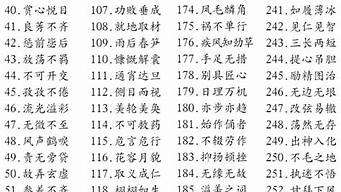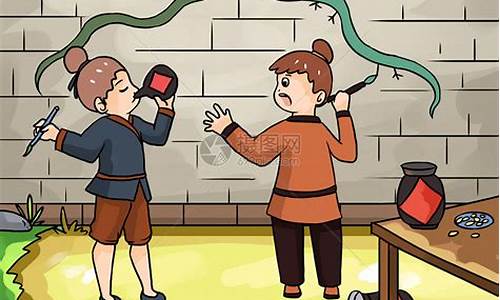compliment和complement的区别_compliment
1.acclaime和compliment和praise有什么区别?
2.With the compliments of the season是什么意思
3.compliment名词形式

要说compliment和complement的区别,必须扯扯complete与comply,这是四个亲兄弟,老大comply,老二complement,老三complete,老四compliment。它们前辈是拉丁语动词compleo填充、补足,原型演变为英语comply,不过含义从当初"任劳任怨"地填充、补足引申为"顺从地满足别人",最后成为今天的"顺从、遵守";老二complement是原型的名词形式,依旧热爱后勤保障老本行,因此意思还是补充、增强;老三complete是原型的完成分词,那肯定是活干完了,所以众所周知,现在意为完成;老四compliment似乎最滑头,虽然也是从原型名词形式演变而来,不过变得油嘴滑舌,只会献殷勤,所以现在意为恭维、赞美。
区别、记忆compliment和complement很简单,compliment中间是i,就是拼音的"衣",穿靓衫需要赞美、恭维;complement中间是e,就是拼音的"饿",饿了需要补给、增强。
compliment和complement很容易区分,而complement与supplement的区别就比较细微了,二者都是补充之意,complement从上面可以知道本意是填、补,因而是对自身的完善、补强。它的名词含义除了补充,还有语法的补语、数学的余角;而supplement则是"锦上添花",是在原有基础上,进一步补充新的内容。所以它的名词含义是增补、增刊、还有数学的补角。
acclaime和compliment和praise有什么区别?
Compliment和Complement的发音相同,都是[?k?mpl?ment],拼写也相似,但是,二者的意义则完全不同。
1、含义区别:
complement是“恭维、敬意、称赞、道贺”的意思。
complement是“补充、补给、补充物”的意思。
2、意义区别:
如果你compliment某人,你就是在表达对他们的赞赏,或者因为某件事而表扬他们。
当我们说一个事物complement另一个事物时,意思就是说,这两个分开的事物合在一起看起来更好:它们对于加强或改善整体效果都起到了作用。
3、例句:
compliment
The airline thanked the passengers for their help and complimented the captain on his initiative.
航空公司对乘客的帮助表示了感谢,并主动表扬了机长。
complement
The recipe was delicious and the wine complemented the food beautifully.
菜很好吃,红酒和食物也很配。
扩展资料
compliment例句:
Make a mental note of the colours you’re wearing whenever people compliment you on the way you look.
每一次别人对你的仪容表示赞赏时,在心里记下你衣着的颜色。
I must compliment all of our employees for their support and commitment this year.
对于今年所有起到帮助和奉献作用的员工,我必须提出表扬。
Passers-by stopped to compliment him on his handiwork.
行人停下来,对他的手工制品赞不绝口。
complement例句:
Most theatres offer complimentary tickets if you review their show for the paper.
如果你再次观看,大多数**院会免费提供票。
We offer a complimentary shuttle service to the airport and historic old town.
我们免费提供去机场和历史古城的交通服务。
Guestrooms offer complimentary bottled water and fresh fruit daily.
会客室每天都会免费提供瓶装水和新鲜水果。
百度百科:英语语法
With the compliments of the season是什么意思
acclaime和compliment和praise的区别为:意思不同、用法不同、侧重点不同。
一、意思不同
1、acclaime:欢呼。
2、compliment:赞扬,称赞。
3、praise:表扬,赞扬。
二、用法不同
1、acclaime:acclaim的基本意思是“称赞”“向?欢呼,为?喝彩”,指对某人或某事物当众给予高度评价或大声喊好,以表示赞美或赏识。acclaim通常不用于被动结构。
2、compliment:compliment侧重客气和礼貌,有时含恭维之意。表示“称赞”,强调客气和礼貌,有时含有恭维的意思。
3、praise:praise的基本意思是“称赞,赞赏,赞美,颂扬,崇拜”,可用于人,也可用于对某项成就的赞扬或上级对下级的赞许,还可表示对神的敬重或虚伪的吹捧。
三、侧重点不同
1、acclaime:Acclaime则更富有情绪化一点。更接近与喝彩或唯某人欢呼。
2、compliment:是以口头或书面的形式给某人美言几句。
3、praise:是以口头或书面的形式向某人表达敬意。
compliment名词形式
With the compliments of the season直译过来为”本季的赞美“.
compliment
[英][?k?mpl?m?nt][美][?kɑ:mpl?m?nt]
n.恭维; 敬意; 道贺,贺词; 致意;
vt.称赞; 向…道贺; 向…致意;
第三人称单数:compliments
复数:compliments
现在进行时:complimenting
过去式:complimented
过去分词:complimented
例句:
1、Firstly I compliment you on most of your excellent Spring issue of 'Triangle'.
首先,让我来夸几句,你们《三角迷踪》春季号的大部分内容都非常精彩。
2、We consider it a compliment to be called 'conservative'.
我们认为被称作“保守分子”是对我们的一种赞赏。
2、It's obvious he's worried about us and I'm taking it as a compliment.
显然他担心我们,我把这当做一种赞美。
LZ 这个词本身就是名词
compliment
com.pli.ment
[`kɑmpl?m?nt; ˋk?mplim?nt]
《源自拉丁文“充满 (礼节) ”的意思》
名词
1 (C)称赞,赞词,颂词; (社交上的) 恭维 (话)
make [pay] a ~ to a person
恭维 [称赞] 某人
fish [angle] for ~s
索求 [探求] 称赞
I take that for [as] a ~.
我把那视为恭维话
同义字
compliment 社交上的称赞
flattery 有谄媚成份的称赞、奉承
2 (C) (藉行为、言语等表达的) 敬意; 光荣
return the [a] ~
回礼; (在受到称赞之后) 答礼
Your presence is a great ~.
承蒙光临深感荣幸
He paid me the ~ of consulting me about the affair.
他向我请教那件事以表示对我的敬意
3 [~s] (合时令等的) 问候 (语) ; 致意,道贺
the ~s of the season (
元旦、耶诞节等的) 贺节的话
Give [Send, Present] my ~s to.
.请代我向…致意 [问候]make [pay, present] one's ~s to a person
向某人致意 [问候]
(-9mZnt; -ment)
及物动词
1
a. [因某事]恭维<某人>,
对…表示敬意,称赞[on]
The teacher ~ed the girl on her good grades.
老师称赞那位女孩成绩优良
b. [因某事]向<某人>道贺,祝贺[on]
~ a person on his success
祝贺某人的成功
2 赠送<某人>
[with]
~ a person with an honorary degree
授与某人荣誉学位
声明:本站所有文章资源内容,如无特殊说明或标注,均为采集网络资源。如若本站内容侵犯了原著者的合法权益,可联系本站删除。












